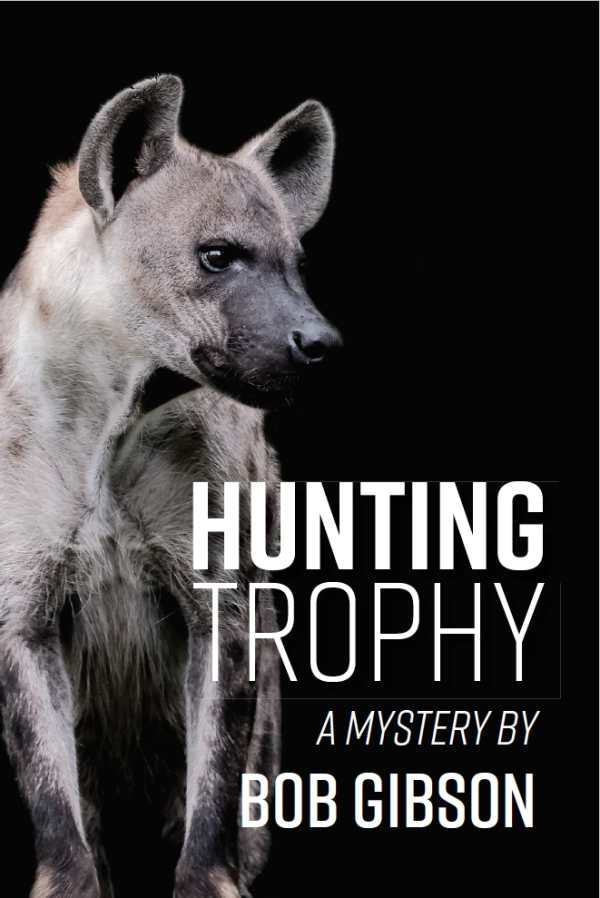
Hunting Trophy
In the international mystery Hunting Trophy, murder, magic, and mayhem visit the tense and tangled African diamond trade.
In Bob Gibson’s mystery novel Hunting Trophy, powerful men control Zimbabwe’s diamond export business; it’s a dangerous field involving money and murder.
Bodies are found in Africa with their heads and organs removed. It’s regarded as a sign of witchcraft by Zimbabwe’s police, who limit their involvement in such cases. But then a similar murder takes place in Canada, and its victim, Jim, is connected to the African diamond business. Jim had been researching the financial aspects of the trade, connecting them to many governments and powerful organizations.
Jim’s new friend is arrested for his murder. Resourceful allies are involved in the case. A Chinese businessman, Chic, finds his investments and life at risk when he, too, is sucked into trade schemes. Mama Prudence and Akatendeka, who are native to Zimbabwe, work in the shadows to see that their people are protected and represented. Elite groups and determined Zimbabweans battle over resources, and all sides are willing to do questionable things to reach their goals.
The narration is personal at its beginning, though the speaker is not identified, but is more broad throughout. The narrator instills a sense of creeping paranoia with their intrusive thoughts and anxiety as the circumstances around Jim’s death become more complicated. However, the tension created by his situation is undermined because of the book’s quick jumps between perspectives, especially once the tale shifts to include the stories of its ever growing cast of accountants, investors, lawyers, and government officials from across the globe. These characters contribute context and information about Jim’s death and other murders, but because of them, the more personal narrative is all but forgotten until the book’s end. Many characters are signaled both by their given names and their nicknames, confusing who is being discussed.
Zimbabwe’s culture and history plays a major role in characters’ attitudes and behavior, and racial tensions and colonization influence the direction of its diamond trade. While most of the story is focused on Zimbabwe, Chinese culture is also touched on via Chic, who struggles with expectations around hard work and honor while working for his father. Other cultural expectations are less defined.
The intricate and clandestine activities of government organizations, private banks, and rich men are defined: privileged characters are able to call upon lawyers, private jets, and extraction teams when they’re in trouble, and they are seen making deals with government officials. These actions are contrasted with their exploitation of African people. While business men like Chic are most worried about their money and investments, Mama Prudence and Akatendeka worry over their lost wealth and hope to take back local control. They also discuss women’s empowerment, its relationship with witchcraft, and social expectations in Zimbabwe, where police and laypeople are hesitant to touch bodies or pursue situations involving witches, to the murderer’s advantage.
While the story is most focused on the ethical implications of the diamond trade, its murder mystery is present throughout. Chic finds himself in the crosshairs, and information about the responsible parties is revealed through his network of collaborators. Chic’s close calls, Jim’s murder, and the unnamed narrator’s case come together in the conclusion, though many other characters have their stories concluded in a more rushed manner.
In the international mystery novel Hunting Trophy, murder, magic, and mayhem follow a group of prominent men as they navigate the tense and tangled African diamond trade.
Reviewed by
Delia Stanley
Disclosure: This article is not an endorsement, but a review. The publisher of this book provided free copies of the book and paid a small fee to have their book reviewed by a professional reviewer. Foreword Reviews and Clarion Reviews make no guarantee that the publisher will receive a positive review. Foreword Magazine, Inc. is disclosing this in accordance with the Federal Trade Commission’s 16 CFR, Part 255.
